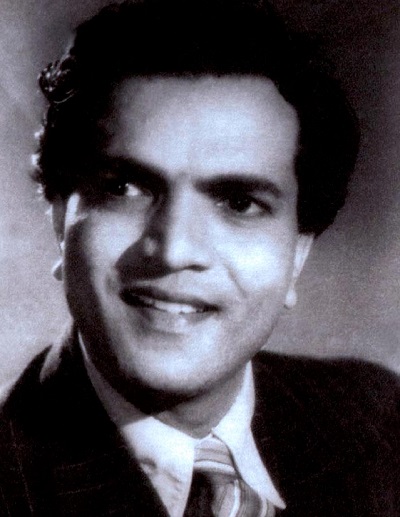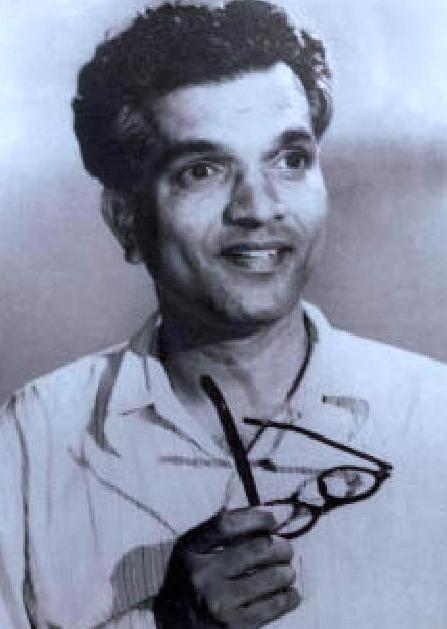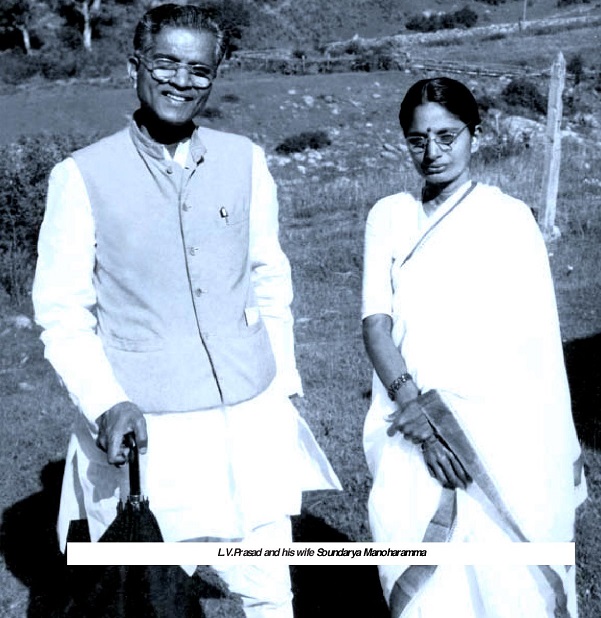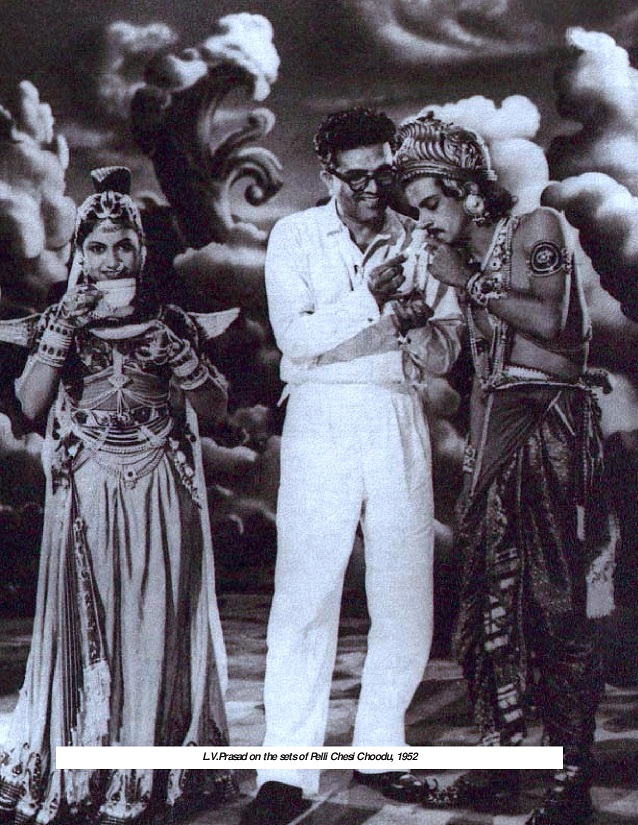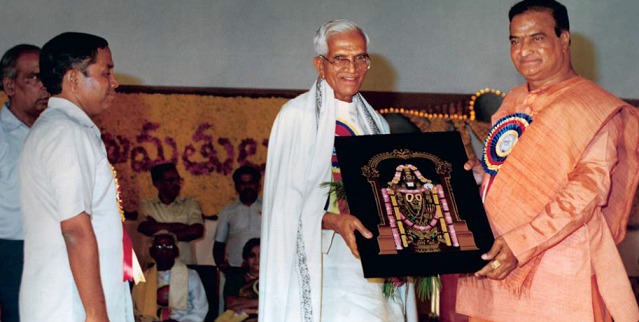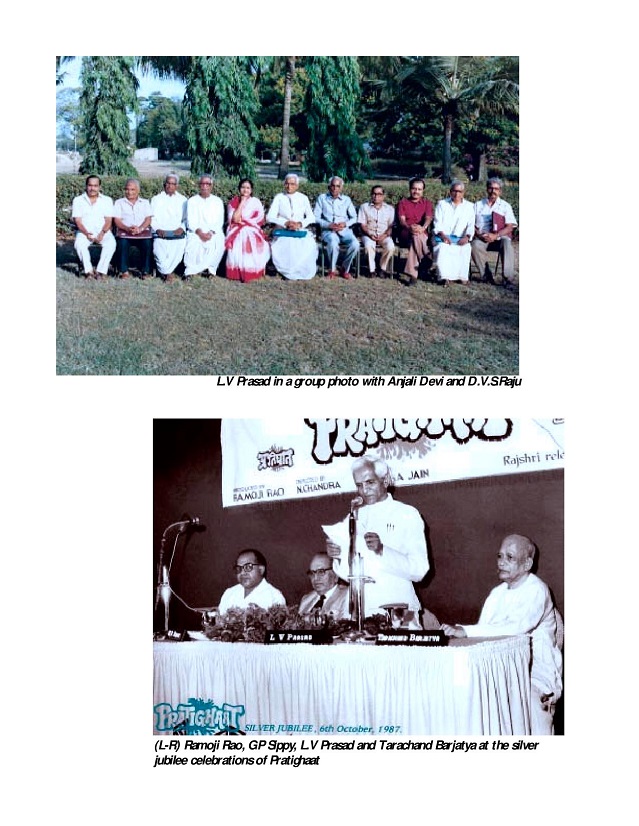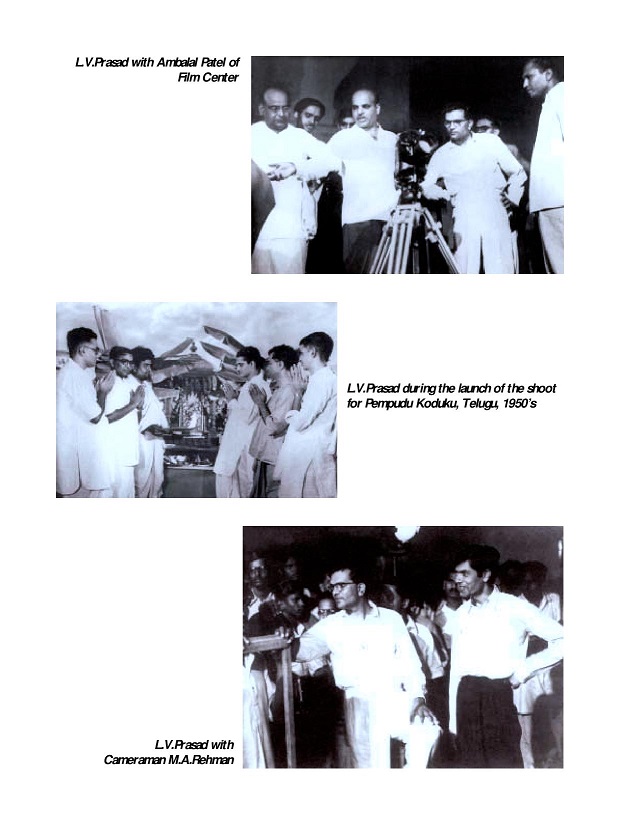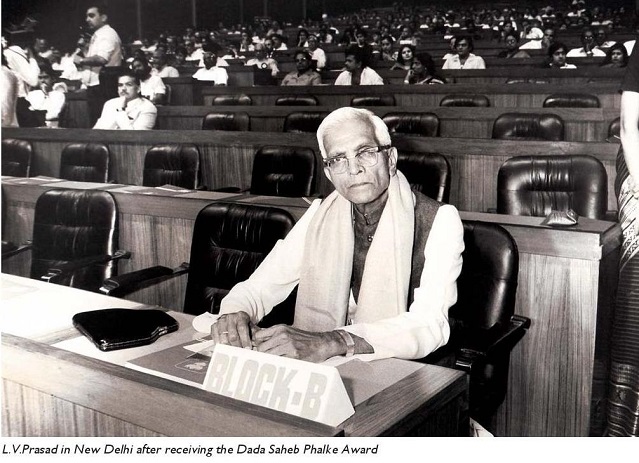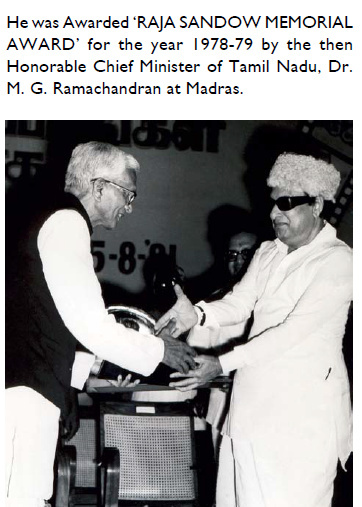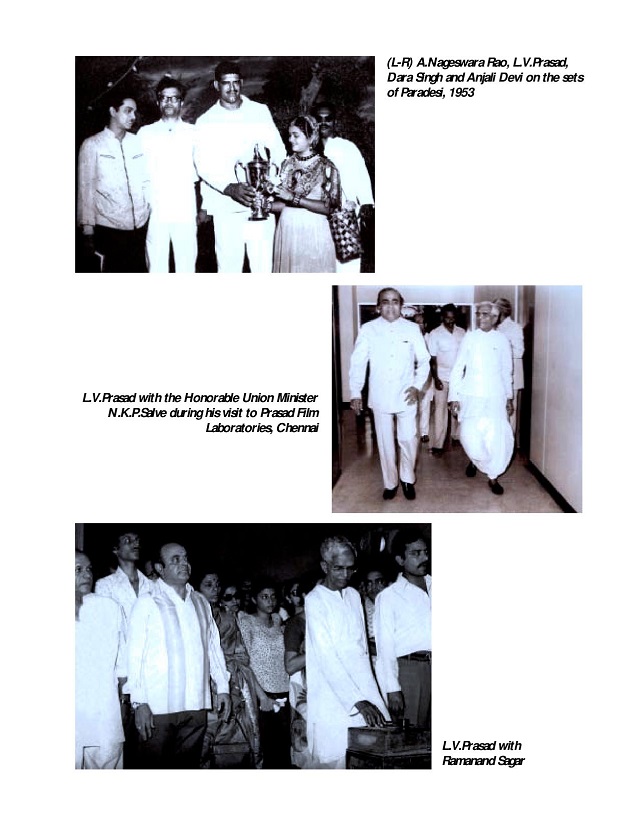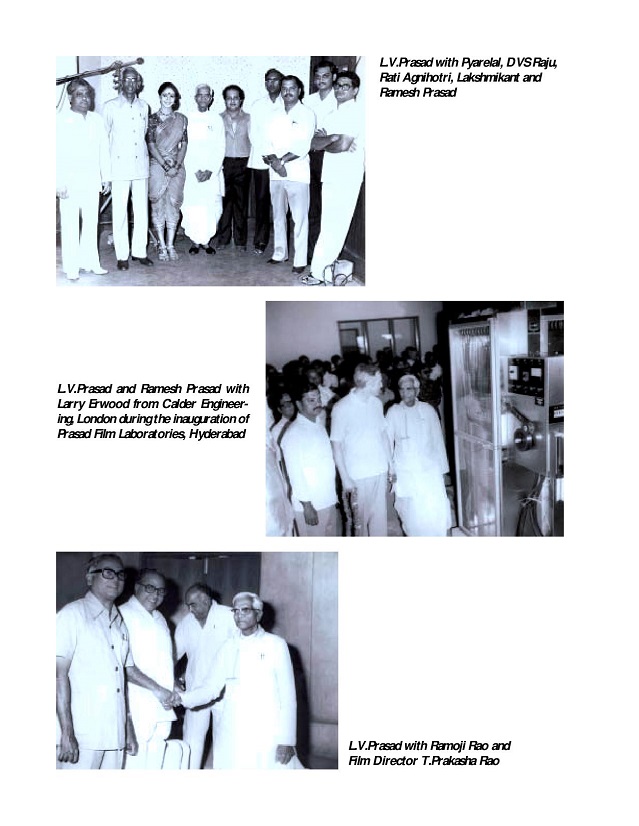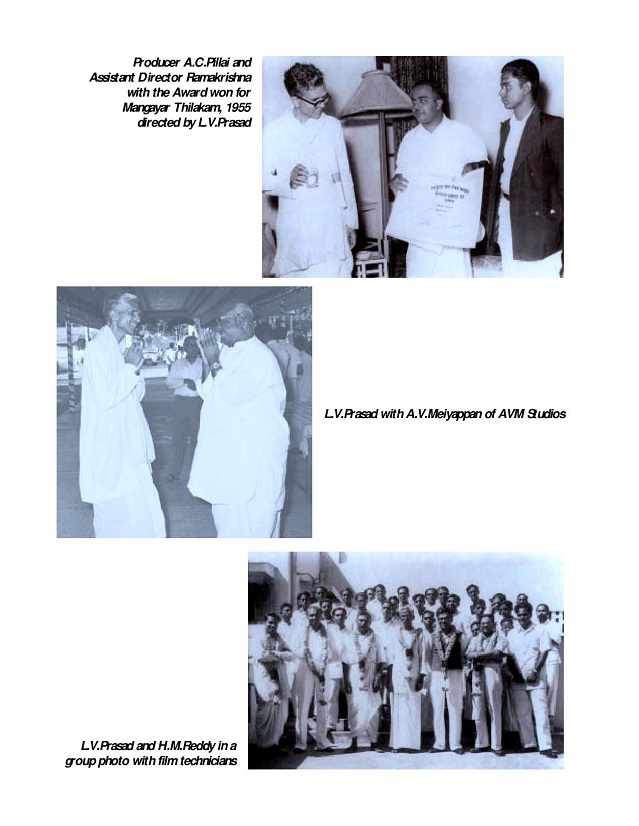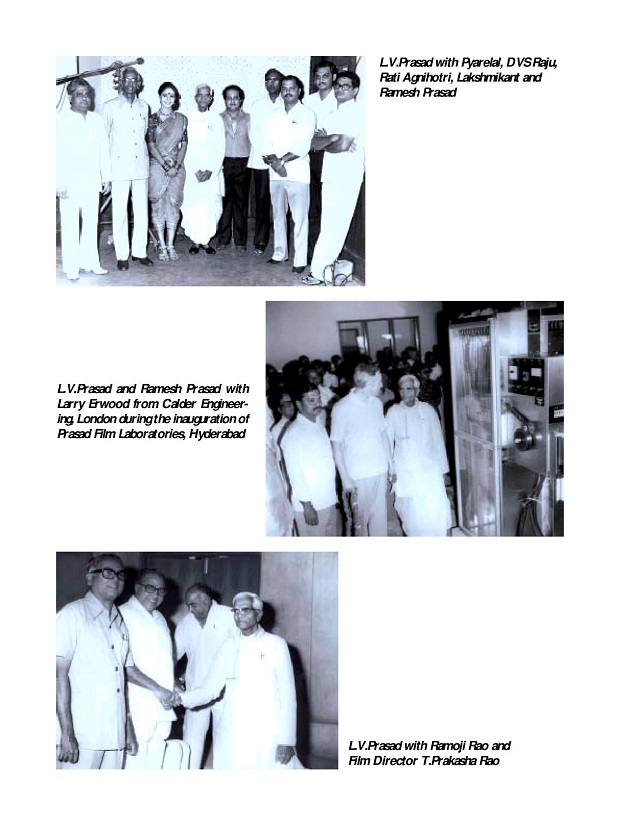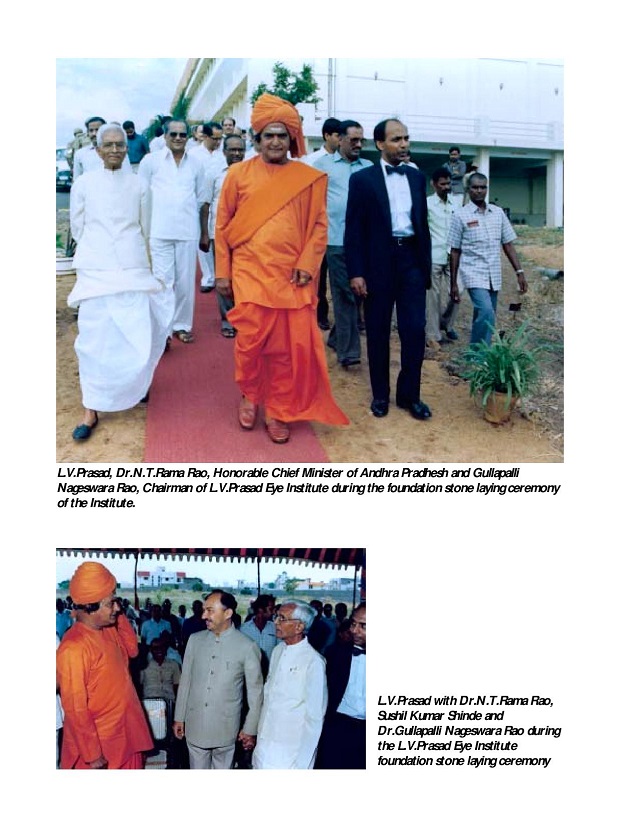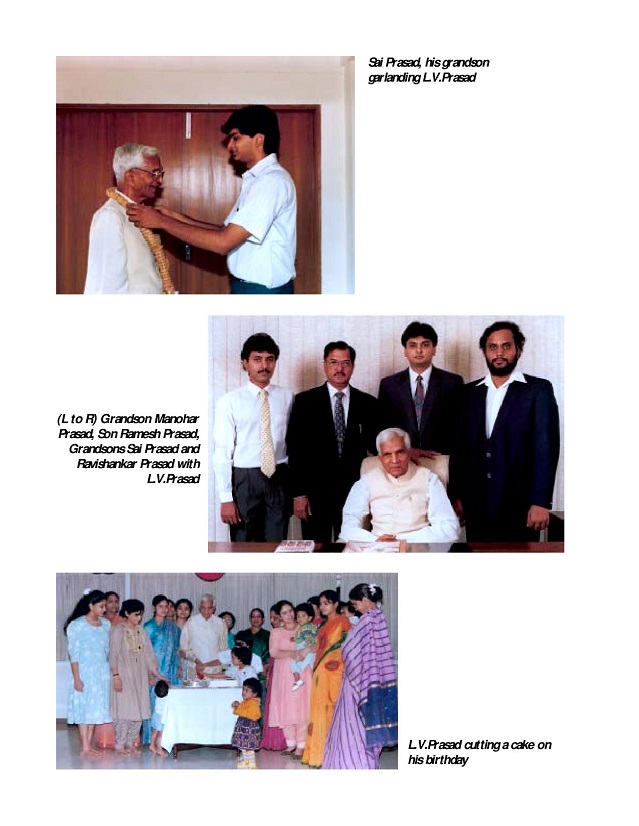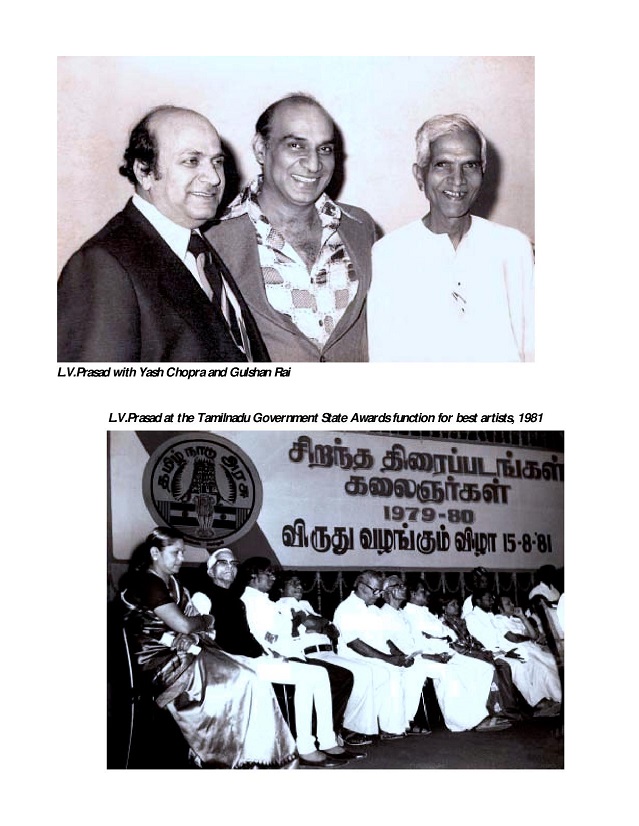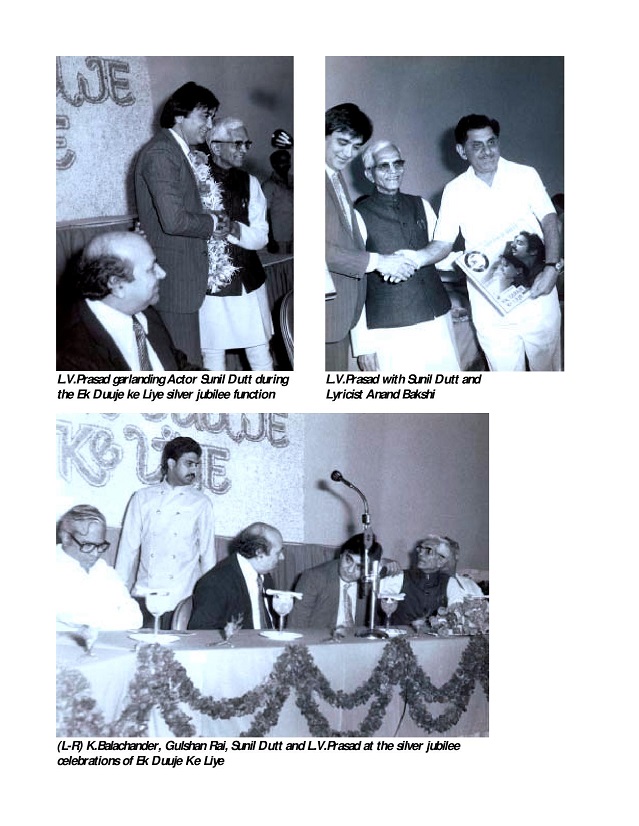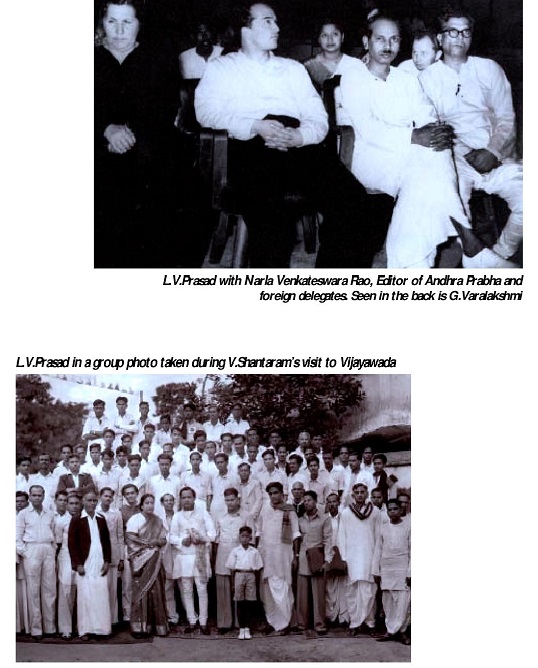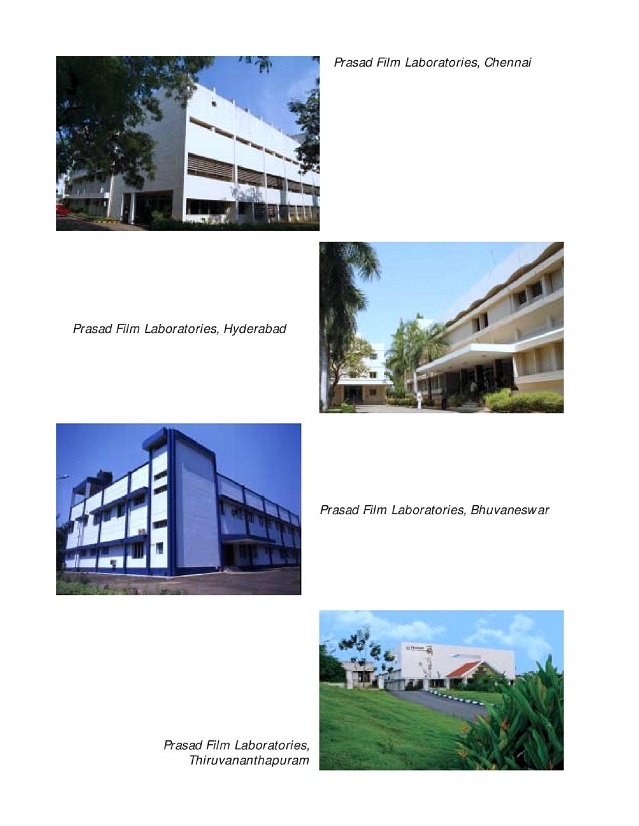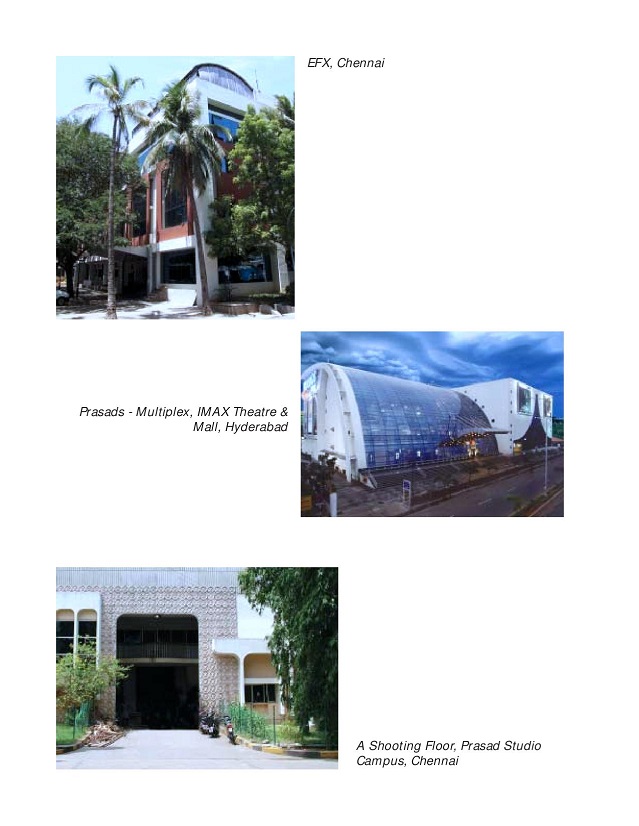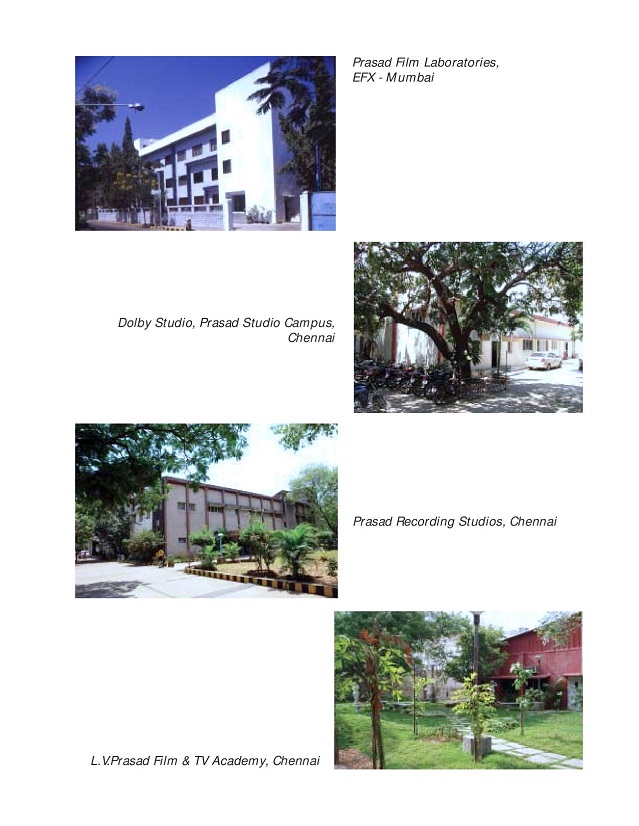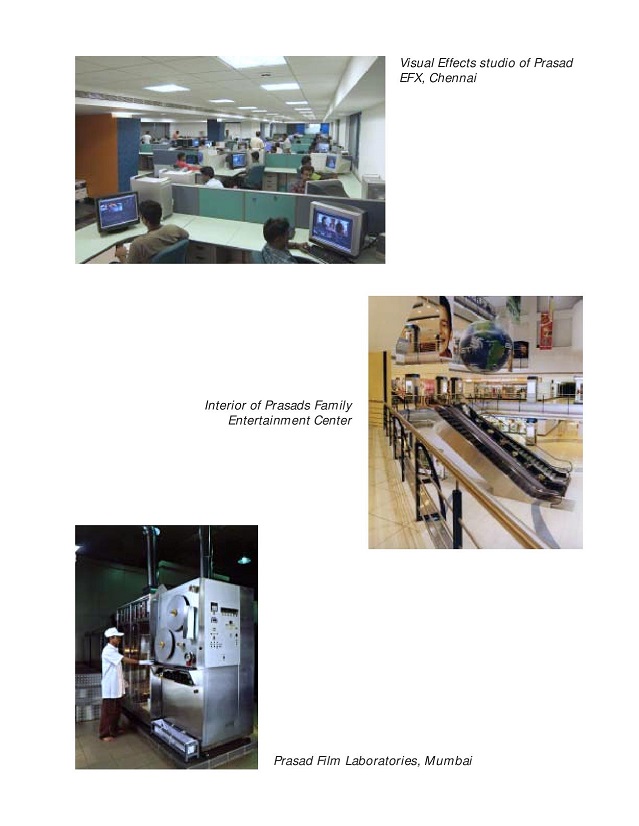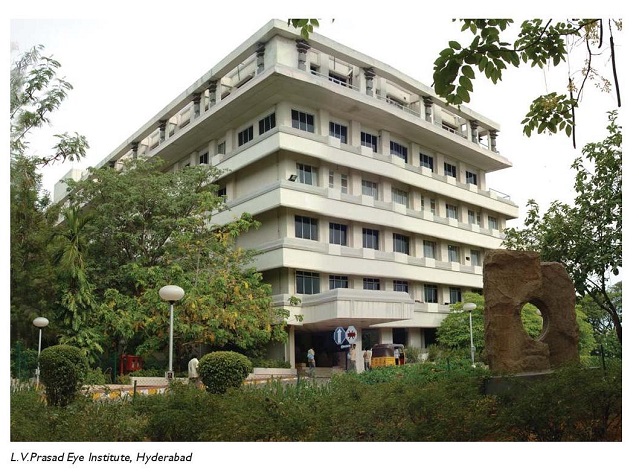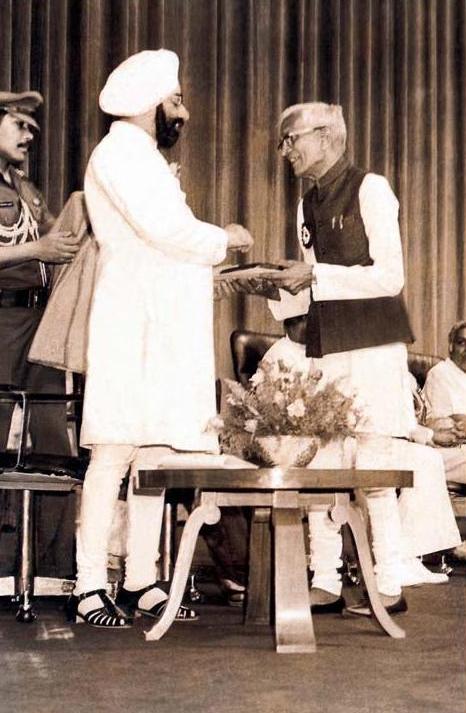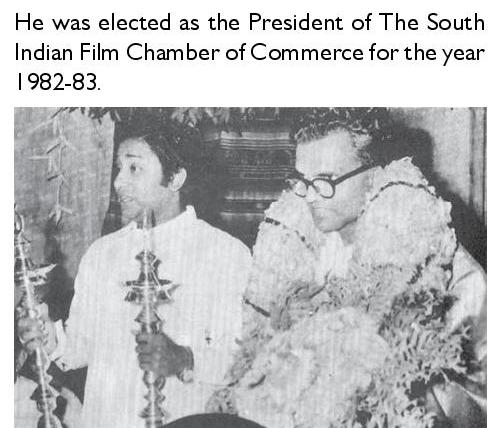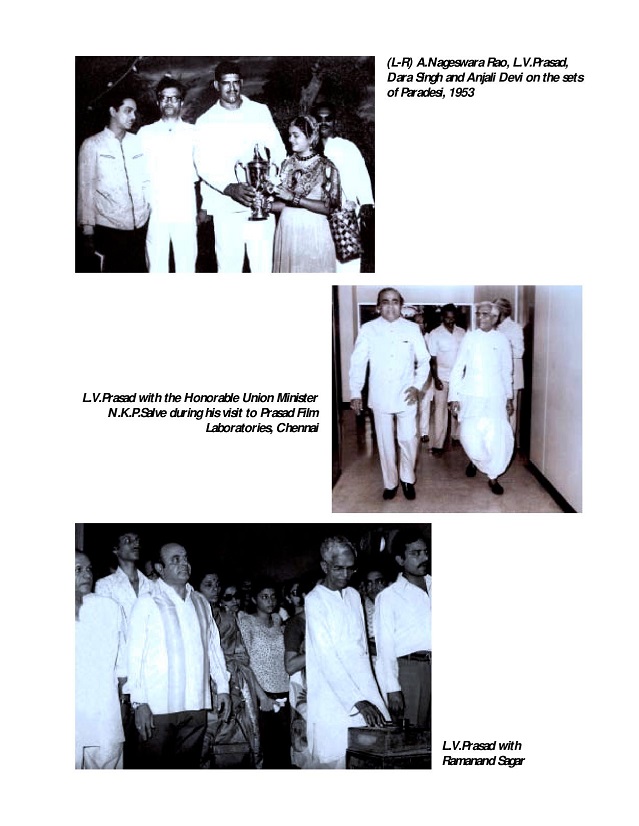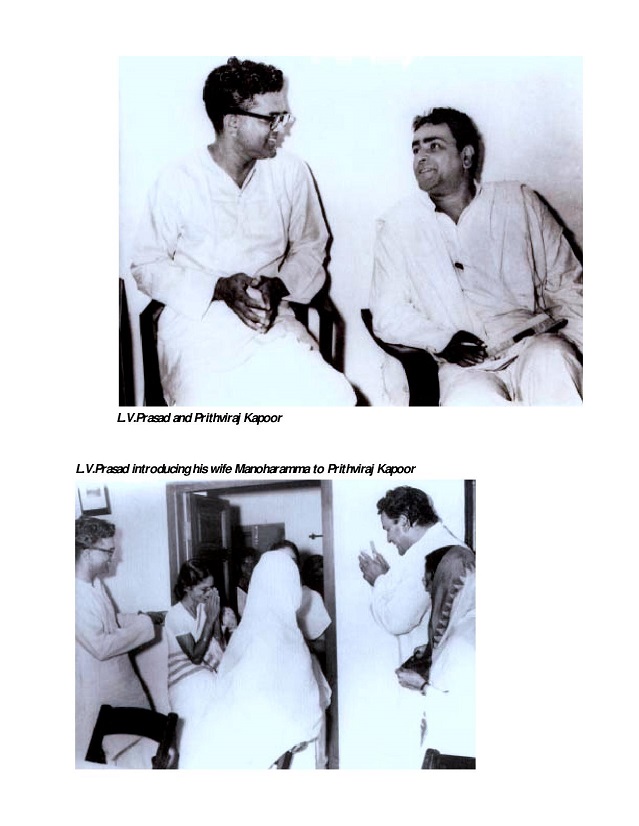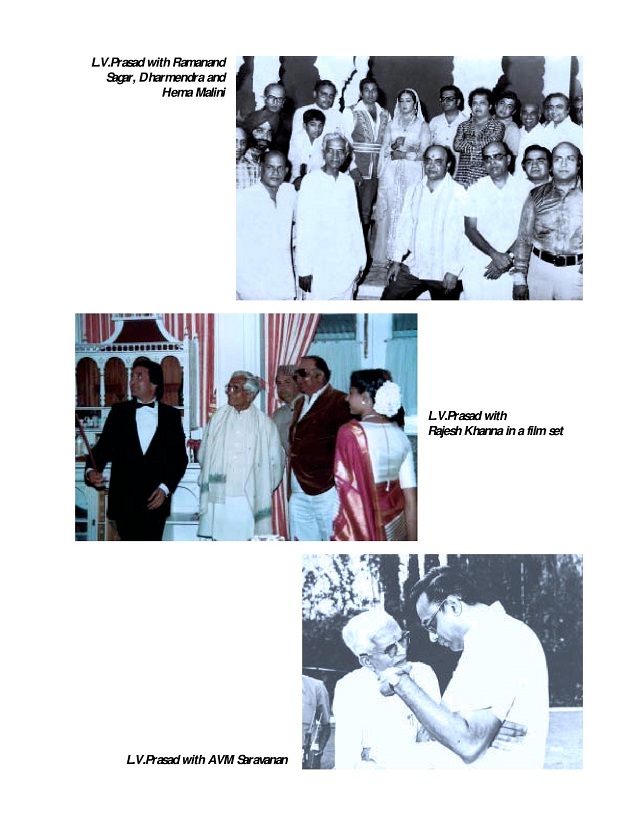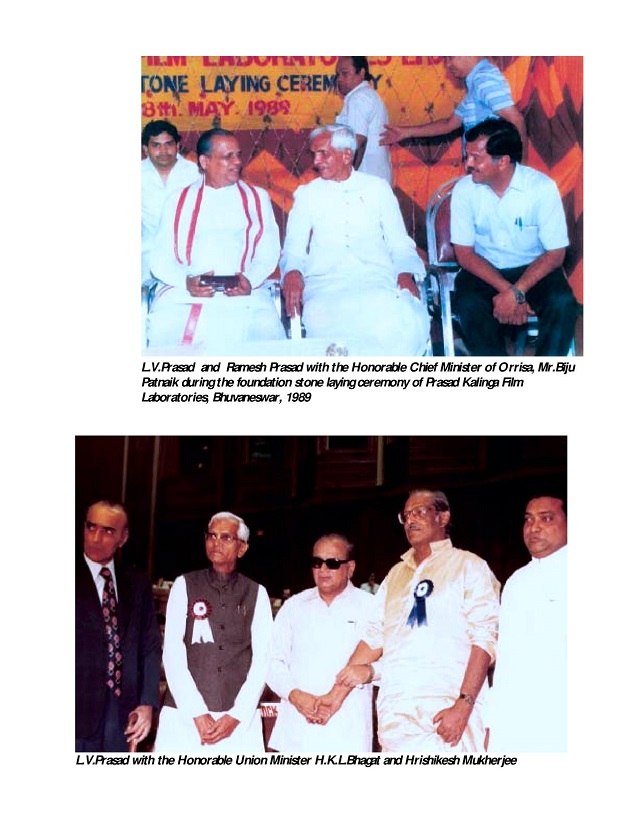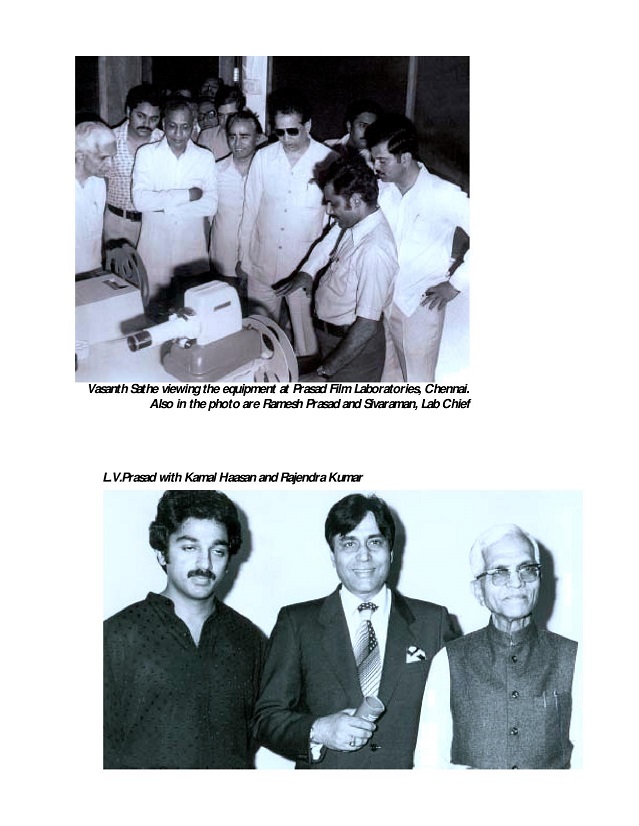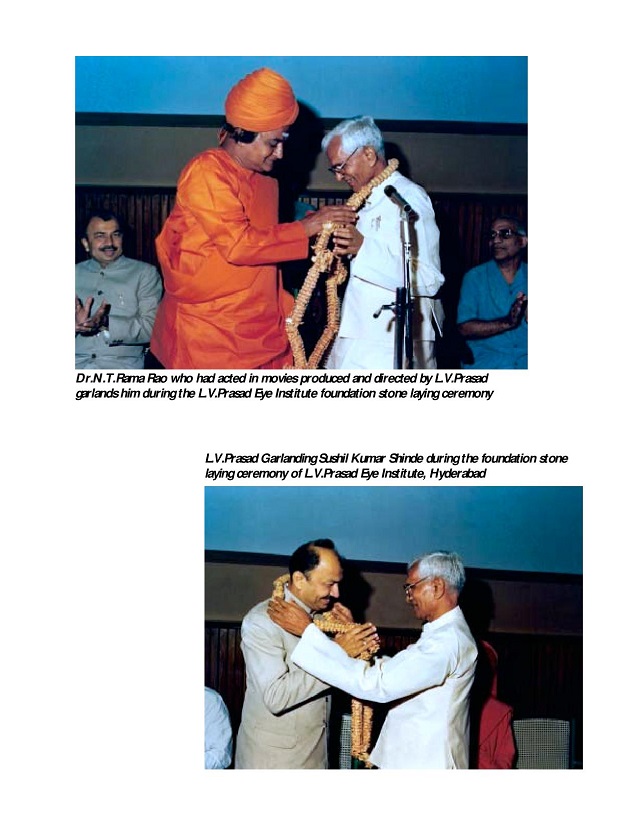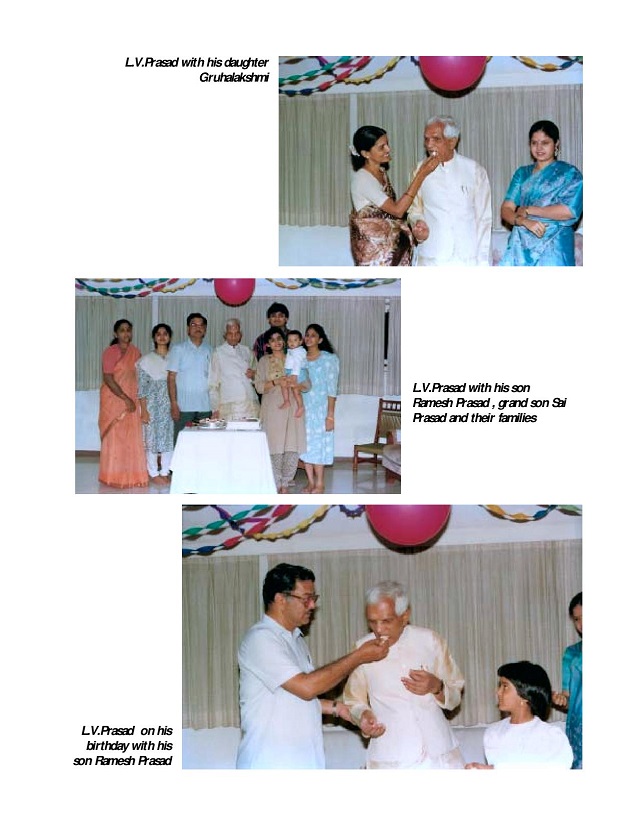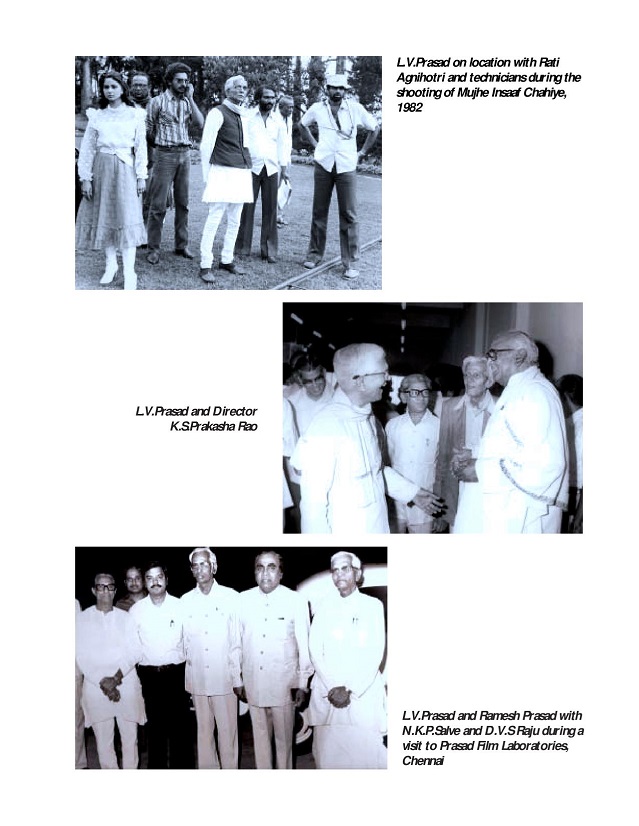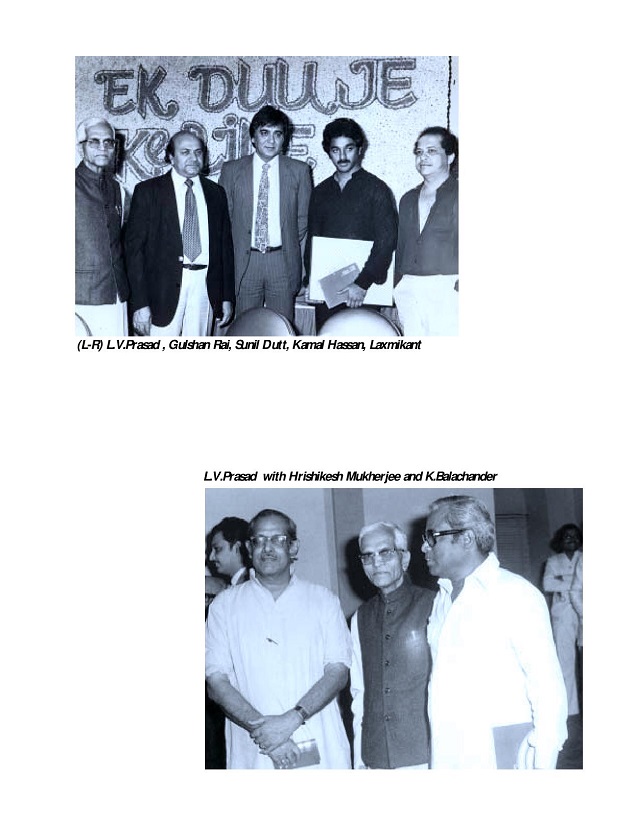L.V.Prasad
This is a collection of articles archived for the excellence of their content. |
Contents |
L.V. Prasad:A man who lived and breathed cinema
Right from the early days L.V.Prasad was driven by the passion for acting and the moving image. He used to take part in the local touring theatres in small roles. He never missed an opportunity to see whatever old and damaged rolls of films that were shown in those days in ramshackle tents. This passion is what took him to Bombay in his quest for cinematic glory. This passion is what made him endure untold hardship in his long road to the heights of glory. His journey to fame was full of potholes and downfalls, but he always managed to find a bright spot. The many disappointed journeys he made between his native village, Bombay and Madras in search of a job or a better life could have left anyone depressed, but not L.V.Prasad. Undaunted he strove to fulfill his passion for cinema. In the mid fifties when he was suffering from a bout of sciatica, his passion for cinema made him ignore the advice for rest and went about his duties. In fact it was after this that L.V.Prasad went on to produce almost all his films. According to Shavukar Janaki, who was introduced by L.V.Prasad in the film Shavukar, ‘One film with him puts an artiste into the mould and one should be lucky to get an assignment to work with him’. B.Nagi Reddy another veteran of the south Indian Film industry remarked “to me Prasad is a veritable Shantaram of the South, for Prasad breathes cinema and has been in it as a loyal and committed worker who has seen it grow to these heights”. Shiva ji Ganesan who acted in Manohara under the direction of L.V.Prasad wrote about him in a magazine in 1983 thus ‘L.V.Prasad’s journey into the world of cinema which began in the silent era, continues till date. For him work has been paramount. Today, when he is over 75 years old, it is amazing to see him so very active. Whether it is seeing a film or offering criticism he is a match to anyone who is years younger. There are many experiences that I treasure from those years of working with him. Prasad would usually act and show the actor how he is expected to do his role. In fact one would become his fan by seeing this kind of tuition.” T.Prakash rao who was an assistant to L.V.Prasad and later became a popular director said ‘he was an expert as far as technical knowledge was concerned. In fact I would not hesitate to say that there is a Prasad School of direction – all his assistants including myself have followed this path set by Prasad.
The Prasad Story:early life
Akkineni Lakshmi Varaprasada Rao was born on 17th January in the year 1908 as the second son to Akkineni Sriramulu and Basavamma in a remote village, Somavarapadu, in Eluru Taluk in the State of Andhra Pradesh in India. Born into an agricultural family Prasad was a pampered child, very intelligent but never interested in studies. Prasad was drawn by the drums of the touring theatres and drama troupes. Old and worn out film prints used to be shown in ramshackle tents and Prasad used to regularly rush to watch them. He also used to do small roles in the local dramas regularly. This was the passion that drove his life – the passion for acting and the moving image. At the age of 17, in the year 1924, he got married to his maternal uncle’s daughter Soundarya Manoharamma in a truly cinematic style and atmosphere. Soon they had a baby girl. Prasad’s father was finding the going tough due to mounting debts and was forced to declare insolvency plunging the family into a deep state of depression and humiliation. This was the time when Prasad thought about his acting prowess to make a career and Prasad left his village, without telling anyone, one day with 100 rupees in his pocket! Prasad had heard of a studio called Kohinoor in Dadar where cinemas are made and artists congregate. On the cold winter morning on the new year’s day of the year 1930 Prasad alighted at Dadar. As he set up his lodging in Ramakrishna Lodge he realized that his dream of being in films is not going to be easy to achieve. To top it he spoke neither Hindi nor English. He tried to convey his ambition to many using his sketchy English vocabulary to no avail. He was unable to gain entry into the studios and looked at another option peering through the holes in the zinc sheets that made the fencing for the Kohinoor Studios. He used to watch for hours together with his eyes glued to these holes. Opposite the Kohinoor studios there was a tailor’s shop frequented by the stars and Prasad used to stand and watch them come and go. The tailor had been noticing Prasad’s dedication in peering through the holes in the fence and understood his passion for films. But the visiting stars found Prasad’s ambitions funny and merely laughed and made fun. Undaunted, Prasad continued to frequent the tailor shop for he was with cinema people here and he was enjoying it. A few days later he returned to his room to find his trunk broken open and whatever little money that was left was stolen. But the kind hearted thief had left a little money and a note suggesting him to go back to his village with the money. He left the hotel with his trunk and returned to pursue his interest to enter the studio. The tailor was now quite intrigued to see him with his trunk and inquired. After listening to Prasad's story he suggested Prasad to stay in his shop, clean the place daily, set up his hookah and start looking for a job later. Though Prasad’s ambitions seemed to be going farther every day he somehow landed a errand boy’s job in Venus Film Company and here he met a Punjabi youth called Dharilal. Venus neither made any films nor did Prasad get his wages. Dharilal got Prasad a job in a carnival to do a little bit of acting- basically talking andenticing people to visit the games. He then joined India Pictures as an errand boy where Akthar Nawaz cast him in a bit role in the silent film ‘Star of the East’. The film was never released. Dharilal’s sister Moti was working in Imperial Film Company and she got Prasad a bit role in Ardeshir Irani’s ‘Alam Ara’ the first India Talkie Cinema released in 1931. Prasad was paid a monthly wage of Rs.30/- for his role in Alam Ara and also to do bit roles wherever required as a pandit, chowkidhar and so on. In Imperial he met H.M.Reddy who had left his police inspector job to try his luck in films. H.M.Reddy gave Prasad a small role in Kalidas, the first Tamil Talkie and subsequently in Baktha Prahalada, the first Telugu Talkie. An excited Prasad dispatched a telegram home, where by now everyone had given him up for dead. He took a train to his native village to tell about his success where he was given the bad news of his little daughter’s death. He returned to Bombay with his wife where his first son Anand and later Ramesh were born. Prasad by chance got a role as an assistant director in Kamar – Al – Zaman directed by Ali Shah. This was also the time Prasad saw his name being shortened from Akkineni Lakshmi Varaprasad Rao to L.V.Prasad by a clerk taking attendance who found the name too long to utter. This name stuck with him forever. Imperial had to retrench people and Prasad was left jobless. Things had not improved for him in the past 8 years, but for some acting, a little bit of assistance in directing and some odd roles. He decided to leave Bombay with his family to his native place with an intention of raising some funds from known people and start his own production company. This did not work.
One day when he was desperate, a telegram came from H.M.Reddy to act in Rohini Pictures Grihalakshmi. He left for Madras and life changed. He made impact in H.M.Reddy’s Tenali Ramakrishna and Gharana Dhonga. World War II was at its peak and the Japanese bombed Madras forcing many to migrate. H.M.Reddy left for Pune with his family and Prasad had to return to his native place. He was deeply depressed now since he found himself a misfit for any job other than cinema. Tantra Subrahmanyam assigned him a job of a production supervisor and assistant director for the film ‘Kashta Jeevi’ which took him to Bombay again. The film was abandoned after shooting three reels. Prasad was in no mood to leave now and he got a job as assistant director in a few other films. During this time using his connections with Prithviraj Kapoor he joined Prithvi Theatres and satisfied his acting passion. It was during this time that he met Raj Kapoor, the hero of his first Hindi production 'Sharada'. Though L.V.Prasad wasnow comfortable the yearning to achieve greater heights made him restless. In 1943 he got the opportunity to take on the responsibility of assistant director for Gruha Pravesham. Due to circumstances he became the director of the film and then he was also chosen as the hero of the film! Gruha Pravesham, released in 1946 was one of the finest films of the forties and went on to become a classic of the period. After this K.S.Prakasha Rao offered Prasad an important role in ‘Drohi’. During this time Ramabrahmam was facing difficulty in finishing his film ‘Palnatti Yudhdham’ due to ill health and he chose Prasad to do justice to this film. After this in 1949, Prasad directed Mana Desam and introduced N.T.Rama Rao, later to become a legend in telugu cinema, in a minor role. In 1950 Vijaya Pictures release their first film‘ Shavukkaru ’ establishing L.V.Prasad as a great director. N.T.Rama Rao became a hero in Shavukkaru and Janaki the heroine, climbed to fame to become known as ‘Shavukkar Janaki’. Samsaram released in the same year brought together the two legends of the telugu film industry as brothers – N.T.Rama Rao and A.Nageswara Rao in a social drama which created records wherever it was released. The film provided a model for later film makers, a model and theme relevant and popular amongst film makers even today. After this success chased him.
He directed some memorable films in the fifties all of them known for their drama and fine humour. ‘Rani’ a hindi film took him to Bombay again and after that Jupiter Films engaged L.V.Prasad to direct their Magnum Opus Manohara starring the legendary Shiva ji Ganesan in Tamil, Telugu and Hindi. This film elevated Shiva ji Ganesan to the greatest heights of stardom. In the mid fifties the industrialist in L.V.Prasad came into being and he purchased a plot offered by Ranganadhadas to start building his own studio. The combined pressure of building the studio and directing films started telling on his health and in 1955 he suffered from a bout of sciatica. Though he recovered sufficiently, his decision to return immediately to his duties, against the doctor’s advice, resulted in prolonged treatment and diet restrictions till the end. But L.V.Prasad had more goals to achieve. In 1955 he assigned D.Yoganand to direct his first production ‘Ilavelpu’ in Telugu under the banner Lakshmi Productions. L.V.Prasad established Prasad Productions soon after this in 1956. His second son Ramesh returned from the US after obtaining his B.E.M.S degree and established Prasad Film Labs in Chennai in 1974. Prasad Productions made many memorable box office hits including Milan, Khilona, Sasural and Ek Duuje Ke Liye. L.V.Prasad contributed generously towards the establishment of L.V.Prasad Eye Institute in Hyderabad, which is today, one the foremost eye research institutes in the world. The efforts started by him in 1956 is today one of the largest infrastructure for feature film post production in India with facilities and offices in India, Singapore, Dubai and Hollywood. During his lifetime L.V.Prasad held many posts and won many awards. In 1982 came the crowning glory of his lifetime – the Dada Saheb Phalke award from the Government of India, the highest recognition in Filmdom in India.
A man of rare distinction
L.V.Prasad was undoubtedly a man of rare distinction. He was the only actor, albeit in small roles, to act in all the first talkies of Indian Cinema; Alam Ara in Hindi, Kalidas in Tamil and Baktha Prahalada in Telugu. L.V.Prasad introduced the legendary actor of South Indian Cinema N.T.Rama Rao in a minor role in Mana Desam(1949) and later made him a hero in ‘Shavukkaru’(1950).L.V.Prasad directed the silver jubilee hit ‘Khilona’ which was also screened in the Dreamland Theatre in Mumbai where he had worked as a ticket collector in the early years of his career! ‘Khilona’ won the Filmfare Award for Best Film. Manohara, a Tamil film directed by L.V.Prasad, in 1954, propelled the Immortal Tamil Cinema Legend Shiva ji Ganesan to dazzling heights of stardom. Dr.M.Karunanidhi, the present Chief Minister of Tamilnadu wrote the script for all the Tamil films produced by L.V.Prasad and also for ‘Manohara’ ‘Iruvar Ullam’ and ‘Thayilla Pillai’ directed by L.V.Prasad. He was Awarded ‘RAJA SANDOW MEMORIAL AWARD’ for the year 1978-79 by the then Honorable Chief Minister of Tamil Nadu, Dr. M. G. Ramachandran at Madras. L.V.Prasad was Chairman of the 27th National Film Festival Awards Selection Committee (Feature Films) held at New Delhi in 1980. He was honoured by the Andhra Pradesh Government with the ‘RAGHUPATHI VENKAYYA AWARD’ for the year 1980. He was honored with ‘UDYOG PATRA AWARD’ by the Honorable Vice President of India, Mr. M.Hidayatullah at New Delhi on 20th December, 1980. He was Chairman of the All India Selection Panel (Indian Panorama) for the 8th International Competitive Film Festival held in New Delhi from January 3 to 17, 1981. Kala Sagar and the Madras Film Fan’s Association bestowed honours on L. V. Prasad on 18th October 1981. L.V.Prasad was Chairman of the International Jury for Children’s Film Festival held in November 1981 at Madras. He received the ‘RAMNATH AWARD-82’ by the Cine Technicians’ Association of South India on 5th June, 1982. In the year 1982 he was awarded the DADASAHEB PHALKE AWARD, the crowning glory of his life. The Dadasaheb Phalke Award is an annual award given by the Indian Government for lifetime contribution to Indian Cinema. It was instituted in 1969, the birth centenary year of Dadasaheb Phalke, considered the father of Indian Cinema. He was given ‘KALAATAPASVI’ award by the popular Telugu cinema weekly magazine ‘SITARA’ on 13th March 1983 at Hyderabad. He was elected as the President of The South Indian Film Chamber of Commerce for the year 1982-83. ‘KALA PRAPURNA’ award was conferred on him by Chancellor, Andhra University at WALTAIR on 21st December, 1985. He was Member of the Board of Film Censors from October 1980 to February 1987. ‘ANDHRA RATNA’ award was conferred on L.V.Prasad by Andhra Pradesh KALAVEDIKA on 27th March, 1987 at Hyderabad. L.V.Prasad was Chairman of the Studio Owners, Council, a wing of Film Federation of India.
Filmography
Actor:
Star of the east (Silent) - Incomplete
1931- Alam Ara - First Hindi Talkie
1931- Kalidas - First Tamil Talkie
1931- Bhaktha Prahalada - First Telugu Talkie
1933- Sita Swayamvar (Hindi)
1940- Bondam Pelli (Telugu)
1940- Chaduvukunna Bharya (Telugu)
1982- Raaja Parvai (Tamil)
Assistant Director & Actor:
1941- Tenali Ramakrishna
1942- Gharana Dhonga (Telugu)
Camera Assistant:
1938- Stree (Hindi)
Assistant Director:
1931- Kamar-Al-Zaman (Silent)
1941- Darpan (Hindi)
1943- Dawal (Hindi)
1944- Lady Doctor (Hindi)
Actor & Director:
1946- Gruha Pravesham (Telugu)
1947- Palnati Yuddham (Telugu)
1948- Drohi (Telugu)
1953- Pempudu Koduku (Telugu)
Director:
Kashta Jeevi (Telugu) - Abandoned
1949- Manadesam (Telugu)
1950- Shavukar (Telugu)
1950- Samsaram (Telugu)
1952- Kalyanam Panni Paar (Tamil)
1952- Rani (Tamil- Hindi)
1952- Pelli Chesi Choodu (Telugu)
1953- Paradesi (Telugu)
1953- Poongothai (Tamil)
1954- Manohara (Telugu. Tamil & Hindi)
1955- Missamma (Telugu)
1955- Missiamma (Tamil)
1955- Mangayar Thilagam (Tamil)
1957- Bhagyavati (Tamil)
1957- Miss Mary (Hindi)
1958- Kadan Vaangi Kalyanam (Tamil)
1958- Appu Chesi Pappu Koodu (Telugu)
1961- Thayilla Pillai (Tamil)
1963- Iruvar Ullam (Tamil)
Producer & Director:
1957- Sharada (Hindi)
1959- Choti Bahen (Hindi)
1964- Beti Bete (Hindi)
1966- Daadi Maa (Hindi)
1969- Jeene Ki Raah (Hindi)
1972- Shaadi Ke Baad (Hindi)
1974- Bidai (Hindi)
1977- Jay Vijay (Hindi)
Producer :
1956- Ilavelpu (Telugu)
1965- Illalu (Telugu)
1961-Sasural (Hindi)
1963- Ham Rahi (Hindi)
1967- Milan (Hindi)
1968- Raja Aur Runk (Hindi)
1970- Khilona (Hindi)
1976- Udhar Ka Sindhur (Hindi)
1965- Idaya Kamalam (Tamil)
1975- Piriya Vidai (Tamil), Thande Makkalu (Telugu), Mane Belagida Sose (Kannada)
1980- Yeh Kaisa Insaaf (Hindi)
1981- Ek Duuje Ke Liye (Hindi)
1985- Mera Ghar Mere Bacche (Hindi)
1986- Swaati (Hindi)
1990- Bidaai ( Bengali)
1993- Ardhana (Malayalam)
1994- Nagpachami (Bengali)
1994-Sandhyadhara (Bengali)
1996-Mayer Katha (Bengali)
1996- Sunapua (Oriya)
L.V. Prasad and his films
L.V.Prasad produced memorable films in many Indian languages, some of which he himself directed. The first film was ‘Ilavelpu’ in Telugu. Almost all the films produced by L.V.Prasad were made under the banner of Prasad Productions making it a household name in those days. Sharada produced in 1957 received unanimous acclaim from the press. The Statesman called it as a film ‘which one should not miss’. Screen called it ‘a high powered melodrama punctuated the good humored interludes’. In 1981 ‘Ek Duuje Ke Liye’ directed by K.Balachander created waves across India and got him the filmfare award for best screenplay. L.V.Prasad, as a film producer gave opportunities to many famous directors of later years to direct his films. Some of them are D.Yoganand, T.Prakash Rao, Srikanth, A.Subba Rao, Kotayya Pratyagatma, Ramakrishna and Chander Vohra to name a few. He also worked with some of the famous directors of the time including K.Balachander and Dasari Narayan Rao. The stars in his films included such famous personalities as Raj Kapoor, Meena Kumari, N.T.Rama Rao, A.Nageswara Rao, Anjali Devi, Shavukar Janaki, Sanjeev Kumar, Jeetendra, Kamal Hassan, Rati Agnihotri, Madhavi, Rajendra Kumar, Saroja Devi, Mehmood, Sunil Dutt, Ashok Kumar, Nutan, Jamuna, Pran, Tanuja, Mumtaz, Raakhee, Shatrughan Sinha, Asrani, Muthuraman, Reena Roy, Asha Parekh, Bindya Goswami, Vinod Mehra, Shabana Azmi, Sarika, Smita Patel, Raj Babbar, Meenakshi Seshadri and Shashi Kapoor to name some.
1956
ILLAVELPU
Language : Telugu
Director : D.Yoganand
Cast : Anjali Devi,
A.Nageshwara Rao
1957
Film : Sharada
Language : Hindi
Director : L.V.Prasad
Screenplay : Inder Raj
Dialogues : Vishwamitter Adil
Lyrics : Rajendra Krishna
Music : C.Ramachandra
Photography : Mukadam
Cast : Meena Kumari, Raj Kapoor
1959
Film : Chhoti Bahen
Language : Hindi
Director : L.V.Prasad
Screenplay & Dialogues : Inder Raj Anand
Lyrics : Sailendra & Hasrat
Music : Shankar & Jaikishan
Photography : Dwarka Divecha
Cast : Balraj Sahni, Shyama
1961
Film : Sasural
Language : Hindi
Director : T.Prakash Rao
Screenplay & Dialogues : Inder Raj Anand
Story : Sadasivabrahmam
Vempati
Music : Shankar & Jaikishan
Photography : Dwarka Divecha
Cast : Rajendra Kumar, Saroja Devi, Mehmood
1963
Film : Hamrahi
Language : Hindi
Director : T.Prakash Rao
Screenplay & Dialogues : Inder Raj Anand
Music : Shankar & Jaikishan
Photography : Dwarka Divecha
Cast : Rajendra Kumar, Jamuna, Mehmood
1964
Film : Beti Bete
Language : Hindi
Director : L.V.Prasad
Screenplay & Dialogues : Inder Raj Anand
Music : Shankar & Jaikishan
Photography : Dwarka Divecha
Cast : Sunil Dutt, Saroja Devi, Jamuna, Mehmood
1965
ILLALU
Language : Telugu
1965
IDAYA KAMALAM
Language : Tamil
Director : Srikanth
Screenplay & Dialogues : Aroordas
Lyrics : Kannadasan
Music : K.V.Mahadevan
1966
Film : Daadi Maa
Language : Hindi
Director : L.V.Prasad
Screenplay & Dialogues : Mukhram Sharma
Music : Roshan
Photography : Dwarka Divecha
Cast : Ashok Kumar, Bina Rai, Durga Khote, Rehman
1967
Film : Milan
Language : Hindi
Direction : A. Subba Rao
Music : Laxmikant Pyarelal
Photography : P. L. Raj
Cast : Sunil Dutt, Nutan Behl, Jamuna, Pran
1968
Film : Raja Aur Runk
Language : Hindi
Director : Kotayya Pratyagatma
Music : Laxmikant Pyarelal
Photography : Ravikant Nagaich
Cast : Sanjeev Kumar, Ajit, Mukri, Mohan Choti
1969
Film : Jeene Ki Raah
Language : Hindi
Direction & Screenplay : L.V.Prasad
Dialogue : Mukhram Sharma
Music : Laxmikant Pyarelal
Photography : Dwarka Divecha
Cast : Jeetendra, Tanuja, Anjali, Manmohan Krishna
1970
Film : Khilona
Language : Hindi
Director : Chander Vohra
Music : Laxmikant Pyarelal
Cast : Jeetendra, Sanjeev Kumar,
Mumtaz
1972
Film : Shaadi Ke Baad
Language : Hindi
Director : L.V.Prasad
Music : Laxmikant Pyarelal
Cast : Jeetendra, Rakhee Gulzar, Shatrughan Sinha, Shyama
1974
Film : Bidaai
Language : Hindi
Director : L.V.Prasad
Photography : Jal Mistry
Music : Laxmikant Pyarelal
Cast : G. Asrani, Birbal, Jeetendra, Leena Chandavarkar
1975
THANDE MAKKALU
Language : Kannada
1975
Film : Piriya Vidai
Language : Tamil
Director : Srikanth
Music : G.K.Venkatesh
Cast : Muthuraman
1975
MANE BELAGIDA SOSE
Language : Kannada
1976
Film : Udhar Ka Sindur
Language : Hindi
Director : Chander Vohra
Photography : Dwarka Divecha
Music : Rajesh Roshan
Cast : Jeetendra, Reena Roy, Asha Parekh
1977
Film : Jay Vejay
Language : Hindi
Director : L.V.Prasad
Music : Rajesh Roshan
Cast : Bindiya Goswami, Prem Krishen, Roopesh Kumar
1980
Film : Yeh Kaisa Insaf
Language : Hindi
Director : Dasari Narayana Rao
Music : Ravindra Jain
Cast : Vinod Mehra, Shabana Azmi, Sarika, Raj Kiran
1981
Film : Ek Duuje Ke Liye
Language : Hindi
Director : K. Balachander
Music : Laxmikant Pyarelal
Cast : Kamal Haasan, Rati Agnihotri, Madhavi
1985
Film : Meraa Ghar Mere Bachche
Language : Hindi
Director : Chander Vohra
Music : Laxmikant Pyarelal
Cast : Smita Patil, Raj Babbar, Meenakshi Seshadri
1986
Film : Swaati
Language : Hindi
Director : Kranthi Kumar
Music : Laxmikant Pyarelal
Cast : Shashi Kapoor, Meenakshi Seshadri, Akbar Khan
1990
BIDAAI
Language : Bengali
Director : Ajit Ganguly
Cast : Prasanjith, Debashree Roy, Satabdi Roy
1993
ARDHANA
Language : Malayalam
Director : I.V.Sasi
Cast : Murali, Radhika
1994
NAGPACHAMI
Language : Bengali
Director : Vijayabaskara Reddy
Cast : Prasanjith, Rituparna Sengupta
1994
SANDHYADHARA
Language : Bengali
Director : Sabyasachi
Cast : Prabhat Roy, Debashree Roy
1996
MAYER KATHA
Language : Bengali
Director : Vijayabaskara Reddy
Cast : Tapas Paul, Rachana Banerjee
1996
SUNAPUA
Language : Oriya
Director : Vijayabaskara Reddy
Cast : Uttam Mohanty, Rachana Banerjee, Aparjita Mohanty
“My 55 years experience”: L.V.Prasad(1985)
“ It was the year 1930. I sneaked out of my house leaving behind my wife and little child, and got into the Bombay bound train, with just hundred rupees in the pocket. My only aim was to join the films as an actor and become a noteworthy figure in the film world. I roamed about the streets of Bombay in search of a job. I used to stand outside the gate of Kohinoor Film Company Studios for hours together with the hope of getting a job. But nothing turned up.
I then diverted my attention to other studios. Sometimes I used to stand outside a studio-gate hoping against hope that I would get some job. But no...... the gates did not open for me. A tailor-friend, on coming to know about my desire to join the film world, got me a job in Venus Pictures on a princely salary of 15 rupees a month. However, they neither made any picture nor paid me any salary. L.V.Prasad in New Delhi after receiving the Dada Saheb Phalke Award, One gentleman, Dharilal by name, who was working in Venus Pictures, got me a job in a Carnival. My salary was one Rupee and eight annas per day.
After working in Venus Pictures' office throughout the day. I used to go to the carnival in the evening and work there till 2 a.m and then walk five miles to reach the tailor's shop to spend the rest of the night. Again, getting up at 5 am, cleaning the shop, going to Venus Pictures' office and from there to the carnival - this happened to be my daily routine. I left Venus Pictures which faced a lot of financial problems and then joined Indian Pictures. Akthar Nawaz was the proprietor of the company. I acted in a bit role in their silent film "Star of the East". In those days, a junior artiste had to do other odd jobs also like carrying reflectors, camera-stands, etc.
Otherwise he would be sacked. Once Akthar Nawaz took us to a far off place for an outdoor shooting. The entire unit stayed in a bungalow, fifteen miles away from the rail- way station. One night, Akthar Nawaz bolted away leaving the crew to its fate. Without money, without food, without even a cup of tea, we waited for Akthar Nawaz for two days. But there was no trace of him. We then walked all the fifteen miles back to the railway station and somehow returned to Bombay, like battered soldiers after a terrific battle. Again the struggle for a job started. After Herculean efforts, I got a job in Imperial Film Company. In those days, bit-role players were engaged on salary basis as regular staff by the Film Companies.
They had to be ready at hand to put on any make-up and appear in group scenes in all the Pictures produced by the Company Imperial Film Company made the first talkie "ALAM ARA". The songs were recorded directly on locations as sung by the artistes. Playback system was not in vogue at that time. So the actors and actresses had to sing themselves. I remember the day when we all went to Ghodbunder to film a song-cum-dance item. Alkananda (sister of Sitara) sang the song "Balama Kahee Honga Hamaresh". Mr. W. M. Khan who played as Fakir in "ALAM ARA" and who sang the song "De De Khudake naam Pe pyare" is my neighbour. Those were days of equality and fraternity amongst the artistes, whether big or small.
Stars like Prithviraj Kapoor, Master Vithal, Billimari Jagadish Sethi, Nayampalli and Mehboob Khan' moved closely with the extra-role players without any inhibition. During this period, I had acted in the first Tamil talkie film 'KALIDOSS' directed by Sri H. M. Reddy featuring Smt. T. P. Rajalakshmi and a Telugu actor and also in Krishna Film Company's first Telugu talkie "BHAKTHA PRAHLADA" directed by Sri H. M. Reddy, in the year 1931.At this time quite unexpectedly I got the job of an Assistant Director under Mr. Gazanfar Ali Shah, who was then directing the film 'KAMAR AL ZAMAN" for Imperial Film Company.
Mr. H. R. Soni (father of Bhappie Soni) was acting as the hero in the picture as well as doing the assistant director's job. Mr. Ali Shah was very tem- peramental and haughty and sometimes would fly into violent fits of anger. At such times, he would shout at people, even draw out his pistol to threaten them. Mr.Soni could not adjust with him and wanted to leave the job. He took me to Mr. Ali Shah and recommended me for the job of assistant director. Thus, by chance I be- came an assistant director. As Long as I worked with Mr. Ali Shah, I never gave him an occasion to shout at me. On the other hand, he was highly pleased with my sincere work. After some time, there was a retrenchment in Imperial Film Company and my services were terminated. Again I stood at the cross roads of life, unemployment staring at my face without mercy. I then got a job in Krishna Cinema(Dreamland) as a door-keeper. At that time, Sri H. M. Reddy was entrusted with the direction of the Hindi picture "SITA SWAYAMVAR" and I did a role in that picture. Sri. Reddy had some misunderstanding with the producer and he left the Company when the picture was almost nearing completion. But I continued to work in the company and even worked as representative for that picture after its release.
The producers were impressed by my sincerity and hard work and made me the Manager of the company. But as ill-luck would have it, that Company was closed after a few days. Again I found myself at the cross-roads of life. Getting a job, losing it and again facing unemployment had become a regular feature and I got accustomed to it, never feeling hopeless or discouraged to face any situation. I then worked as a Production Manager in New Era Company and afterwards as a Manager-cum Camera Assistant in Renuka Pictures. I also worked as a camera assistant for the film "STHREE". I then played a number of bit roles in many pictures. At this time, Sri. H. M. Reddy asked me if I could come to Madras and work as his assistant. I readily agreed and went with him to Madras. I did not have many opportunities to study and learn the technical aspects of film making. Besides working as Mr. Reddy's assistant,
I played the hero's role in his picture "SATYAMEJAYAM" and a small role in "TENALIRAMAKRISHNA". In 1942, one Mr. Thandra Subramanyam took me as the director for his picture "KASHTAJEEVI" to be produced in Bombay. So I went back to Bombay again. But that picture was abandoned after three reels were shot. I then worked as an assistant director for Geethanjali Pictures, "SAWAL". Then I joined Valli Saheb and worked for his picture "LADY DOCTOR". Afterwards I worked as an assistant director for the pic- tures "DARBAAN" and "NEK PERVIN" and also wrote the script for the film "DEVER". I then joined Prithvi Theaters and played small roles in the dramas "DEEWAR" and "SHAKUNTALA". In 1945, I went to Madras to direct the Telugu film "GRIHA PRAVESHAM". I also played the hero's role in that picture. The picture was very well received by the public and I earned a good name as a Director. The year 1945 was a land mark in my life; and after "GRUHA PRAVESAM", a number of pictures such as PALNATIUDDHAM, DROHI, MANA DESAM, SHAVUKAR, PELLI CHESI CHOODU, PARDESI, MISSAMMA, SAMSARAM, Manohara, Mangayar Thilagam and Bhagyavathi were directed by me. THAYILLA PILLAI and IRUVARULLAM were produced as well as directed by me.
I floated Laxmi Productions in 1955 and produced "ILAVELPU" in Telugu and then started Prasad Productions Private Ltd in 1956 and produced my first Hindi film "SHARADA" and then a series of Hindi films. I feel happy that the Industry in which I toiled and sweated has at last blessed me with success and high honours. I recollect, with nostalgic memories, the fifty five years of my bitter and sweet and looking back, I enjoyed every moment of my fight for a place in the industry to reach where God has placed me today. I remember with deep reverence those great men of the past who toiled and laboured against odds for the advancement of this industry and paved the way for making it mighty and strong as it stands today. May the film industry grow still bigger and mightier, this is my only prayer. Primarily I owe everything to the people who see my films. But how can anyone see a film without the most precious of God's gift to man, namely, the EYES?
I am told that over 75% of the curable blind in this country belong to the younger age group and the poorer section. I thought that I should in some small measure repay back to them the affection shown to me, by establishing THE L.V. PRASAD EYE INSTITUTE, so I sponsored on 17-10-86 to this Institute Rupees one crore and sixty lakhs and the land. The foundation stone was laid by the Honourable Chief Minister of Andhra Pradesh, Sri N. T. Rama Rao at Hyderabad. With the dedicated efforts of Doctor Gullapalli Nageshwara Rao, who is internationally recognised for his research in Cornea transplants, it will be ready to serve L.V.Prasad Eye Institute, Hyderabad the public in 1988 with modern and sophisticated equipment.”
As an industrialist
L.V.Prasad lived and breathed cinema and it was his wish that whatever he earned out of his films was ploughed back into the development of cinema. In his long ordeous path to glory, he found that every ten years there occured a change for the better in his professional life. The first ten years saw him struggle to become a successful Director. The next ten years made him claim the position of a successful Producer and before completion of the next decade he had become a proud owner of a Studio which he took over from Ranganadhadas of Rajyam Pictures, who had produced a memorable social film titled ‘Samsaram’, which was later made in Hindi and Tamil by S.S.Vasan. The studios became fully functional in the year 1965 with the active participation of his son-in-law RVMK Prasad, an Engineer. In the following years he produced great box office hits in Hindi and once again proved his total devotion to cinema by establishing a state-of-the-art film processing laboratory in Chennai to process not only his films but also that of film makers from South India and Bombay.
The Laboratory was the brain child of his son Ramesh, an engineer from the USA, who, took the vision of L.V.Prasad forward and established more film labs in Hyderabad, Bangalore, Bhuvaneswar, Trivandrum and Mumbai, making Prasad Film Labs the largest such network of facilities in India. These laboratories are fully supported with excellent infrastructure for audio, film editing and other lab related services. It is pertinent to note that L.V.Prasad always longed to get the best of equipment available in the world and he was the first to import Oxberry optical printer & animation stand as early as 1956 and he even had a German technician working on the machines! L.V.Prasad, being a true film maker, knew the importance of good cameras and pioneered the establishment of an outdoor unit equipment division with his first son Anand in control. Later it was named Anand Cine Services and is today the largest such service provider in India, now managed by Anand’s sons Ravi Shankar Prasad and Manohar Prasad. Today Prasad Group has production facilities in Chennai, Hyderabad, Mumbai, Bangalore, Bhuvaneswar, Thiruvananthapuram, Kolkatta, Singapore, Hollywood with additional marketing offices in New Delhi and Dubai.
Sai Prasad, an electronics engineer and son of Ramesh Prasad foresaw the dawn of the digital future way back in the late 80’s and started guiding the group into the digital world of post production. Through its state-of-the-art facilities Prasad Group offers all services related to digital post production namely Digital Intermediate, Visual Effects, Telecine, Reverse Telecine, High Definition Post production, Digital Film Restoration and more. Ramesh Prasad, continuing in the spirit and legacy of L.V.Prasad, took his father’s vision of wholesome family entertainment further, started ‘Prasads’, a one of its kind family entertainment center in Hyderabad housing a 5 screen Multiplex, Imax Theatre, entertainment zones, shopping, food court and more, incorporating some of the best brands in the world. This Mall was launched in 2003 and in a short period it has become ‘the happening place’ in Hyderabad. Ramesh Prasad, seeing the dearth of good film education facilities in India implemented his father’s vision of providing higher education in the art and technology of film making by starting L.V.Prasad Film & TV Academy in 2005, providing courses in Film Direction, Cinematography and Audio Engineering. Traditionally, Prasad Group, as a pioneer, has always brought the latest and the best equipment available to serve its customers. Continuing this tradition, Prasad Group is today expanding at a rapid pace and investing in latest technologies and equipment. Recently Prasad Group have brought the world famous Panavision Cameras to India. Clients from around the world come to Prasad Group to work on their projects and outsource to its facilities in India. Keeping in mind the requirements and expectations of a global clientele Prasad Group is investing a lot of time and manpower in customer experience management. The future is Digital and Prasad Group is already a leader in providing cutting edge digital solutions for all aspects of film production, post production and exhibition.
The visionary who saw all this happening in the future, L.V.Prasad, is no more with us, but he would have been a proud man today to see Prasad Group take these strides forward.
